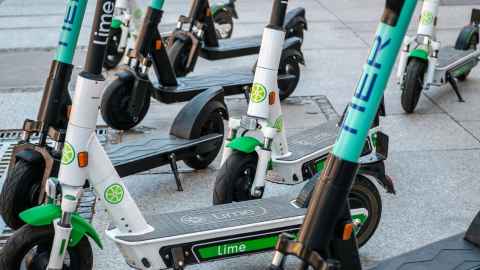Electric scooters make Auckland extremely age-unfriendly
24 October 2019
Opinion: Dr Claire Dale believes the Auckland Council's decision to welcome electric scooters onto footpaths is incompatible with their intention to become an ‘age-friendly’ city.

Auckland Council welcomed electric scooters onto footpaths in October 2018, then in May 2019 announced its intention to become ‘age-friendly’. The utter incompatibility of e-scooters on pavements and age-friendly environments escaped the Council decision-makers.
After the first e-scooter death in Auckland in June 2019, Transport Minister Phil Twyford said "We are going to regulate to ensure the users of these scooters can share public spaces in a way that's safe and reasonable for everyone."
While we wait for those regulations, the frequency and severity of accidents involving the e-scooters continue to explode.
University of Auckland researchers looked at 708 acute orthopaedic operations at Auckland City Hospital between October 15, 2018 and February 22, 2019, before Wave, Jump and Flamingo - entered the e-scooter market. Auckland surgeons are operating on more e-scooter injuries than motorbike injuries, and e-scooter crash victims are arriving at hospital with the sort of traumatic, multiple injuries usually only seen after car crashes.
Of 98 acute operations which related to wheeled vehicles excluding cars, 23 operations were for e-scooter riders, costing a total of $360,557 excluding the victims’ lost income. The study did not capture injuries not requiring surgery so the true cost of e-scooter injuries were much higher. The study suggested that the speeds possible and the inherent instability of e-scooters posed an increased risk compared to other wheeled vehicles. It is also worth noting that nearly all the injuries happened on publicly available Council-licensed e-scooters.
If e-scooters were confined to roads, like bicycles are, we wouldn’t see 2-up on an e-scooter, with the second rider often a child. Road rules would be obeyed, and we wouldn’t have pedestrians nervously approaching every corner, trying to watch both in front of them and behind, hoping they will not be knocked down by a speeding e-scooter.
I recently visited London and Los Angeles, and it took me some time to realise why I was relaxed walking around those cities. In London, e-scooters are currently illegal, although hundreds of Londoners have bought their own and police often turn a blind eye instead of confiscating them or dishing out fines. And the owners e-scoot on the roads, not the footpaths.
Los Angeles has confined e-scooters to roads. So far, data collection is not good, however, a study out of Austin, Texas published in early May showed that of 190 people injured while riding e-scooters over a 3-month period, nearly half sustained head injuries, 15% suffered a traumatic brain injury, and only 1% of riders were wearing helmets.
In Paris, the 20,000 e-scooters (more than the entire USA), despite being confined to riding on the roads, have caused numerous complaints, injuries and near misses. Mayor Anne Hidalgo and police want to limit speeds to 20km/h in most areas and 8km/h in areas with heavy foot traffic, and prohibit parking anywhere but designated spaces. Although the e-scooters are in a legal grey zone, the city imposes €135 fines for riding on the pavement and €35 fines for blocking the pavement while parked, and operators are charged by the city for any broken scooters that need to be picked up by municipal workers.
A year after they arrived on our footpaths, Lime acknowledges safety remains a big concern: claims for ACC e-scooter injuries topped $4.3 million with more than 2000 claims between October 2018 and July 2019.
In Auckland, the city’s pavements are becoming a battleground between e-scooter riders and pedestrians. It is a battle the pedestrians cannot win. Auckland pavements will not be age-friendly as long as they are ruled by e-scooters. This means Auckland City is not age-friendly.
Dr M. Claire Dale is a research fellow at the Retirement Policy and Research Centre at the University of Auckland Business School.
This article reflects the opinion of the author and not necessarily the views of the University of Auckland.
Used with permission of the New Zealand Herald, Walkers losing the e-scooter battle, published on 21 October 2019.
Media contact
Miranda Playfair | Media Adviser
Mob: 021 063 8393
Email: m.playfair@auckland.ac.nz